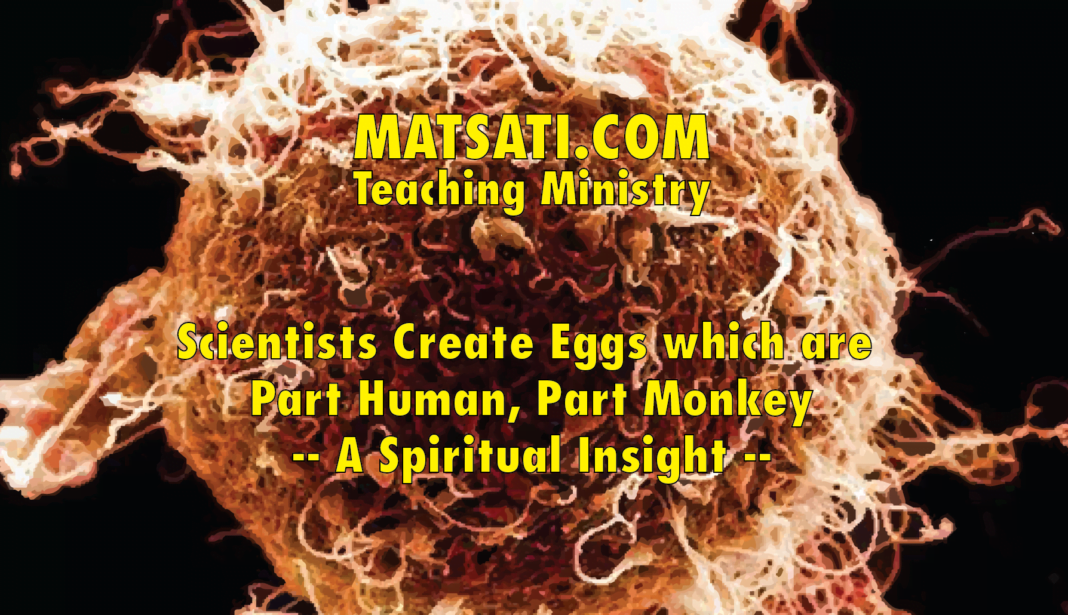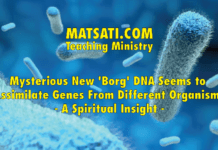Scientists recently reported [1] on generating an interspecies chimera by mixing human pluripotent stem cells with cynomolgus monkey (Macaca fascicularis) embryos cultured ex vitro. The scientists chose to do this in an effort to advance the scientific understanding on the generation of organs and skin tissue for transplantation. Previously studies have been conducted on mouse and pig embryos. The research demonstrated the eggs survived, proliferated, and generated the post-implantation cell lineages.
References
- Tao Tan, Jun Wu, Chenyang Si, Weizhi Ji, Yuyu Niu, Juan Carlos, Izpisua Belmonte, “Chimeric contribution of human extended pluripotent stem cells to monkey embryos ex vivo,” Vol 184, Is 8, P2020-2032.E14, APRIL 15, 2021, DOI: https://doi.org/10.1016/j.cell.2021.03.020
This type of research is very concerning in not just matters of ethics and morals, but also from a biblical perspective. Scientists and bioethicists however defend these experiments as necessary using the argument that organ transplantation is a major problem in modern medicine. Thousands of people die every year in the USA due to waiting for an organ transplant. These efforts are meant to inject human stem cells into animal eggs in order to eventually grow human organs in such animals for transplantation. Previously when injecting human stem cells into mouse and pig eggs, these chimera failed. With the combination of human and monkey cells, these embryos survived for up to 19 days. This enabled scientists to learn more about how animal and human cells communicate. The researchers state that with this new information, they can now go back and try to re-engineer these pathways that are successful for allowing appropriate development of human cells in these other animals (mouse and pig).
When we think about what scientists are doing, this reminds us of the chimeras of Greek mythology which are part lion, part goat, and part snake. The chimaera of Greek Mythology is a monstrous fire-breathing hybrid creature of Lycia in Asia Minor. The Neo-Hittite Chimera from Carchemish, dated to 850–750 BC, which is now housed in the Museum of Anatolian Civilizations, is believed to be a basis for the Greek legend. It differs, however, from the Greek version in that a winged body of a lioness also has a human head rising from her shoulders. Note the Dragon was also considered a chimera as being a reptilian monster sharing similar hybrid, flying and fire-breathing traits.
This research is discussing the topic of genetic chimerism which is a single organism composed of cells with more than one distinct genotype. In animals, this means an individual derived from two or more zygotes (a diploid cell resulting from the fusion of two haploid gametes; a fertilized ovum), which can include possessing blood cells of different blood types, subtle variations in form (phenotype) and, if the zygotes were of differing sexes, then even the possession of both female and male sex organs (this is just one of many different phenomena that may result in intersexuality). Animal chimeras are produced by the merger of multiple fertilized eggs. In plant chimeras, however, the distinct types of tissue may originate from the same zygote, and the difference is often due to mutation during ordinary cell division. Normally, genetic chimerism is not visible on casual inspection; however, it has been detected in the course of proving parentage (i.e. the process by which one compares the genetic connection of a given child to its parents).
The Spiritual Insights that we receive from this type of research is related to morals and ethics coupled with the Torah commands against such things. The specific command is stated all in one sentence according to Vayikra / Leviticus 19:19.
ספר ויקרא פרק יט
אֶֽת־חֻקֹּתַי֮ תִּשְׁמֹרוּ֒ בְּהֶמְתְּךָ֙ לֹא־תַרְבִּ֣יעַ כִּלְאַ֔יִם שָׂדְךָ֖ לֹא־תִזְרַ֣ע כִּלְאָ֑יִם וּבֶ֤גֶד כִּלְאַ֙יִם֙ שַֽׁעַטְנֵ֔ז לֹ֥א יַעֲלֶ֖ה עָלֶֽיךָ׃
Vayikra / Leviticus 19:19
19:19 “‘Keep my decrees. “‘Do not mate different kinds of animals. “‘Do not plant your field with two kinds of seed. “‘Do not wear clothing woven of two kinds of material.
We note the first part of this verse states, אֶֽת־חֻקֹּתַי֮ תִּשְׁמֹרוּ֒, “you are to observe My statutes / laws.” previously (in Vayikra / Leviticus 18) when the Torah led a paragraph with this introduction, what followed were the laws about family purity, chastity, incest etc. (see Vayikra / Leviticus 18:5-23) Now it introduces laws of a similar nature applying to different categories of vegetation, and their derivatives, i.e. mixing wool and linen. Fruit bearing trees must not have branches of other types of fruit grafted onto their trunks. Now the reason Moshe wrote kilayim (כִּלְאָ֑יִם) which is the prohibitions against “mixed kinds,” is that God has created in the world various species among all living things, both plants and moving creatures, and He gave them the ability for reproduction enabling them to exist as long as the Lord God Almighty would desire the existence of the world, and He further endowed them with a power to bring forth only after their kind. This means that this characteristic of being brought forth after its own kind will never be changed, as it is said with reference to all of them, i.e. after its kind. (see Bereshit / Genesis 1:11, 21, 24). This is a God given driving force in the normal mating of animals is for the sake of preserving the species, even as human beings engage in sexual activity for the sake of having children. Therefore the idea is when one who combines two different species, he or she thereby changes and defies the work of Creation. (Ramban on Vayikra / Leviticus 19:19 Part 1) Moreover, when we think about this, the mating of diverse species of animals does not produce viable offspring. Take for example those species which are close to one another, the horse and the donkey. When mated produce a mule which has the strength of both animals, but does not have the ability to reproduce. Because these species have been mixed, their seed is cut off, for they themselves cannot produce offspring. Thus from the point of view of these two matters when one combines two different species, one is changing the order of Creation and the sterility of the product which is direct scientific evidence of having violated God’s command! Maimonides wrote in his Moreh Nebuchim Guide of the Perplexed III, 37, the reason for the prohibition against wearing a garment made of wool and linen, is because at that time this kind of garment was used by the priests and pagan magicians to adorn themselves when performing their activities, and he [Maimonides] says that he found it so written in their books. Note how the Satanist wears the hooded cloak for specific ritual purposes as it is stated according to Anton Lavey in the Satanic Bible. This is why the Torah forbids the mixing of threads because there is a serious spiritual significance to these things! And since this was for them a matter of great importance, and very much desired by them in order that they perform their activities in honor of the idols and demons, therefore the Torah removed it from being worn by all people, since the Torah intends to blot out their deeds from memory. (Ramban on Vayikra / Leviticus 19:19 Part 2) This is significant as the Lord God commands us according to Vayikra / Leviticus 18.
ספר ויקרא פרק יח
א וַיְדַבֵּר יְהוָֹה אֶל-מֹשֶׁה לֵּאמֹר: ב דַּבֵּר אֶל-בְּנֵי יִשְֹרָאֵל וְאָמַרְתָּ אֲלֵהֶם אֲנִי יְהוָֹה אֱלֹהֵיכֶם: ג כְּמַעֲשֵֹה אֶרֶץ-מִצְרַיִם אֲשֶׁר יְשַׁבְתֶּם-בָּהּ לֹא תַעֲשֹוּ וּכְמַעֲשֵֹה אֶרֶץ-כְּנַעַן אֲשֶׁר אֲנִי מֵבִיא אֶתְכֶם שָׁמָּה לֹא תַעֲשֹוּ וּבְחֻקֹּתֵיהֶם לֹא תֵלֵכוּ: ד אֶת-מִשְׁפָּטַי תַּעֲשֹוּ וְאֶת-חֻקֹּתַי תִּשְׁמְרוּ לָלֶכֶת בָּהֶם אֲנִי יְהוָֹה אֱלֹהֵיכֶם: ה וּשְׁמַרְתֶּם אֶת-חֻקֹּתַי וְאֶת-מִשְׁפָּטַי אֲשֶׁר יַעֲשֶֹה אֹתָם הָאָדָם וָחַי בָּהֶם אֲנִי יְהוָֹה:
Vayikra / Leviticus 18:1-5
18:1 Then the Lord spoke to Moses, saying, 18:2 ‘Speak to the sons of Israel and say to them, ‘I am the Lord your God. 18:3 ‘You shall not do what is done in the land of Egypt where you lived, nor are you to do what is done in the land of Canaan where I am bringing you; you shall not walk in their statutes. 18:4 ‘You are to perform My judgments and keep My statutes, to live in accord with them; I am the Lord your God. 18:5 ‘So you shall keep My statutes and My judgments, by which a man may live if he does them; I am the Lord. (NASB)
Here the Lord God Almighty speaks to Israel warning them not to walk in the way of the Egyptians and the Canaanites as they are an abomination. So the idea here is Vayikra / Leviticus 19:19 is the Torah warning us to be holy by reason of not forcing or violating the natural norms. Note this also includes violation of personal freedoms of your fellow man by violence. (Chizkuni, Vayikra / Leviticus 19:19 Part 2) We are not to tamper with what the Creator has seen fit to create as a separate species, as this may result in the creation of new viruses which are more deadly than would naturally occur without man’s intervention. Ibn Ezra says that the reason for this law to prevent cross breeding, whether animal or plant, serves as a reminder related to other commands in the Torah. He says the festival of unleavened bread is one example of not mixing sin with holiness in our lives during Passover and the festival of unleavened bread. Sukkot serves as a reminder of dwelling in the wilderness (Vayikra / Leviticus 23:43) and of want and need and trusting in the Lord. The tzitzit serves as a reminder of God’s Commands (Bamidbar / Numbers 15:39). The sound of the Shofar is a reminder for God’s people of the Lord’s revelation to repent. The mezuzah is meant to remind us to teach Torah to our children and as God’s Word being a foundation upon which our homes are sanctified as holy unto the Lord. And even the patriarchs such as Abraham, is a reminder for us how he was made complete, whole, and called out from His people, how he kept the charge of God, God’s commandments, statutes, laws, and judgments (Bereshit / Genesis 26:5) (Ibn Ezra on Vayikra / Leviticus 19:19 Part 2) Rabbeinum Bahya states the following adding a spiritual aspect to this command:
Rabbeinu Bahya, Vayikra / LEviticus 19:19 Parts 1-4
According to the plain meaning of the text the reason for these prohibitions is that all the things G’d created be they living creatures or merely vegetable matter each have their own mazzal, or representative in the celestial regions; each species was created as such, a principle underlying the whole creative process, where again and again G’d speaks of their being למיניהם, “according to their species.” Anyone who mixes species contravenes the expressed wish of the Lord. It is as if he denied the fact that the universe and all there is in it was created by the directives of the Lord. It is tantamount to expressing the view that G’d did not know how to best exploit the potential of the species He created. Adding new species through grafting is like second-guessing G’d.
According to the Scriptures, anyone who mixes species does so against the expressed command of God. The Midrashic approach based on Tanchuma Shelach 15 the rabbis say the words “do not seed your field using a mixture of species of seed,” represents the verse Isaiah יְהוָ֥ה חָפֵ֖ץ לְמַ֣עַן צִדְק֑וֹ יַגְדִּ֥יל תּוֹרָ֖ה וְיַאְדִּֽיר, “It pleased the Lord for the sake of His righteousness to make His Torah great and glorious.” (Isaiah 42:21). This means that every area of life is regulated by Torah. Notice how in this instance, our lives have been regulated concerning ploughing, seeding, harvesting, weaving fibers and even wearing mixtures of clothing containing certain mixtures of fibers. Remember the Torah is about sanctifying our lives for God because he first sanctified us. We as His people are called to walk in that sanctification. Not also how according to Parashat Kedoshim we are commanded not to eat all kinds of animals, etc. The Torah commands are meant to sanctify our lives such that we can be representatives of God. This is the gospel message that was preached to that generation in the wilderness. (Hebrews 4) We note why God speaks of חקות שמים, “laws of heaven” (Job 38:33, הֲ֭יָדַעְתָּ חֻקּ֣וֹת שָׁמָ֑יִם אִם־תָּשִׂ֖ים מִשְׁטָר֣וֹ בָאָֽרֶץ׃). Statutes which are known as the “laws of heaven” have been addressed to God’s people and signify the high regard we should have for God’s word and the importance of God’s word for our lives.
In addition to all of these things, the rabbis also discuss this in relation to the first two human beings who were born on earth. Their interpretation is that these brothers were of different species, (Cain and Abel), one being the child of evil and the other that of Adam’s divinely inspired spirit. This scientific research which violates this mitzvah (command) draws out this aspect of the Torah, as to why we are commanded to keep our distance from spirit of impurity, which is paralleled to mixing species as in the case of Cain and Abel. This behavior or way of life is forbidden as we have learned the consequences of doing these things is death. The idea of mixing species is as mating opposites, similar to one who mixes a little sin here and a little righteousness there, etc we are not called to live in this way. It does not take superior wisdom to realize that this is contrary to the way of God, contrary to the kind of lives we have been called to live. Note also the command to not wear clothes with mixed threads alludes to the spirit of impurity which the wearer is not to “put upon his person” when he wears such a garment. Note again the spiritual connects, as the rabbis discuss the practices of the nations in their religious services. There are many deep spiritual Truths that come out of this Torah command found in Vayikra / Leviticus 19:19. Again, this also provides us with insight into why the rabbis say mixing different kinds of seeds, denies and throws into disorder the work of Creation. When we walk in these ways as violating God’s commands, we through our lives and the lives of those around us into disorder. This is the meaning of our being created for the Glory of God and for maasim tovim (good works, Ephesians 2:10) and not for sin. These are the truths which are drawn out when we lay the scientific research down along side of Scripture. These things also reveal to us how all of Scripture is relevant for us today and profitable for instruction in righteousness of which we are called to live. (2 Timothy 3:16)









